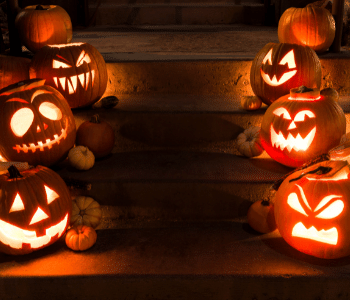17 Copyright and/or Plagiarism Stories for Halloween

Yesterday, we looked at the myriad of ways that copyright and trademark impact Halloween costumes. Along the way, we discussed why a knockoff Beetlejuice costume is titled “Juice Demon”, the ways that intellectual property laws govern Halloween costumes and the ways one could find themselves in trouble.
However, that is just the latest in a decade-long history of discussing copyright, plagiarism and other authorship issues as they pertain to Halloween and horror.
So, this year we’re going to take a look back at the various tales of copyright infringement and/or plagiarism that we’ve looked at over the years. We’ll understand the myriad of ways copyright has helped to shape the spookiest of holidays, and how you can keep yourself (legally) safe through it.
While good copyright practices can’t protect you from the ghosts and goblins, they may help keep the lawyers away.
Copyright and Halloween
For the purpose of this list, we’re breaking apart the stories that deal with the copyright aspect, namely legal issues related to copyright infringement, and the plagiarism aspects, which deal with the ethical and authorship issues, into two separate lists.
Please bear in mind that many of these stories are old and are not written to the standards of the current site. Also, many have design errors due to their age. I’m working to fix those, but it will take time. With that said, here’s some spooky copyright stories to send chills down your spine:
- 5 Copyright Issues for Halloween: Starting in October 2010, this article takes a look at some of the more broad copyright issues and how they impact Halloween. Those include, music, movie characters, costumes, and stories. Though not a deep article, it’s an interesting overview of the topic and a look at the copyright challenges we face running our small haunted house.
- Copyright Challenges in Creating Garbage Horror: Back in October 2011, my partner and I were running a small YouTube channel named Garbage Horror, where we reviewed various low-budget horror movies. However, even back then, there were significant copyright challenges in doing so. An interesting look back at the YouTube of a decade ago. This was also our first post in the “Creepy Copyright Mondays” that I published that year.
- How a Copyright Mistake Created the Modern Zombie: The second in the Creepy Copyright Mondays series was an explainer on how Night of the Living Dead, one of the most iconic zombie films, fell into the public domain. It’s an interesting story that actually explains a great deal about our modern zombie lore.
- Dracula vs. Nosferatu: A True Copyright Horror Story: After that, also in October 2011, we looked at the copyright tale of Nosferatu and how the famous vampire survived destruction. In short, the estate of Bram Stoker sued the filmmakers behind Nosferatu and won. Nearly all copies of the film were destroyed, but an American copy survived, as Dracula was already public domain in the United States.
- How Universal Re-Copyrighted Frankenstein’s Monster: Next in “Creepy Copyright Mondays” is the tale of Frankenstein’s monster and why, even though the story itself has long lapsed into the public domain, the most iconic version of the monster is very closely protected by Universal Pictures. It’s an interesting look at how a public domain source and a modern interpretation can clash.
- 10 Great Public Domain Horror Movies: Wrapping up the 2011 run, this article is simply a list of 10 great horror movies that are in the public domain. This means that you are free to download, stream, publicly perform or do anything with these works. This includes simply enjoying them alone in the dark.
- HAuNTcon 2016 – Copyright and Trademark for Haunters: Skipping ahead to January 2016, at that year’s HAuNTcon, a convention for haunted attraction owners and operators, I gave a talk on copyright and trademark for haunters. It was actually one of half a dozen times I gave this talk.
- Copyright and the Rocky Horror Picture Show: The Rocky Horror Picture Show is the film with both the longest theatrical release in history and the film that defines the term “cult movie.” However, its copyright history is rather mundane. That said, this May 2016 article tells that story and sneaks in at least 10 Rocky Horror call-outs along the way…
- Copyright and Metropolis: Metropolis is one of the most iconic films of all time. Released in 1927, it is a film that has been lost, rediscovered, placed into the public domain and then put back under copyright protection. It’s a film with a wild copyright history that needs to be told. That’s exactly what this October 2016 article does.
- Brains! A Story of Missed Attribution and Missed Opportunity: Finally, this September 2018 article tells the story of the musician Aurelio Voltaire and how his potential big break became something of a bust. After selling the rights to one of his songs to Cartoon Network for use in a TV show, Voltaire was surprised to learn that his music wasn’t being attributed. So, despite massive exposure, he didn’t see much of an increase in his audience.
Plagiarism and Halloween
While the legal issues may be the more famous, Halloween, horror and monsters have inspired more than a few interesting plagiarism stories, consider the ones below:
- The Shape of Non-Plagiarism: 2018 turned out to be a banner year for Halloween-related plagiarism stories. The first comes from January, which looks at the movie The Shape of Water. At the time, it was facing accusations that it was as plagiarism of a 2015 short student film. The case did go on to become a lawsuit, but it was eventually dismissed.
- Repo: The Plagiarism Opera: The next month, we took a look at a similar set of allegations, these made against the 2010 blockbuster film Repo Men. Many fans of the cult film Repo! The Genetic Opera felt that the themes and details of the movie hit a little too close to home. However, a closer examination finds that plagiarism isn’t just nonexistent, but impossible.
- Creating a Fake Plagiarism Story: In September 2018, I decided to try something a bit different. Rather than covering a plagiarism story, I decided to create one. By comparing the Star Trek episode Castpaw to The Rocky Horror Picture Show, I was able to make a convincing argument the latter was a plagiarism. However, that’s clearly not the case and it’s a lesson on how looking at only similarities can lead one to believe untruths.
- Plagiarism in Pop Culture: Re-Animator: In October 2018, I decided to do an entry into my series of Plagiarism in Pop Culture on the film Re-Animator. Here, we examine the plot of the film and how realistic the plagiarism in it really is. For a horror film, its take on plagiarism is surprisingly nuanced and interesting.
- Plagiarism in Pop Culture: Coco: The next month brought another addition to the Plagiarism in Pop Culture series, this one looking at the film Coco. The film centers around the Mexican Day of the Dead, but the overarching plot features a plagiarism and attribution battle that spilled over into the afterlife.
- The Cinemassacre Monster Madness Plagiarism Scandal: Finally today, earlier this month we took a look at a plagiarism scandal that impacted one of my personal favorite Halloween traditions, Cinemassacre’s Monster Madness. It’s an interesting look at the dangers of working with multiple authors and how it can harm one’s reputation.
Bottom Line
All in all, this is a very interesting time of year for both copyright and plagiarism news. When you count yesterday’s story, that’s 17 stories that can be considered to be Halloween-related on this site. Considering that the site was founded in August 2005, that’s more than one story per year.
Somehow, I don’t think those stories are going to stop or slow down. As Halloween grows both more popular and more lucrative, battles over authorship and ownership are only going to become more common.
So stay safe this Halloween, both physically and legally…
Want to Reuse or Republish this Content?
If you want to feature this article in your site, classroom or elsewhere, just let us know! We usually grant permission within 24 hours.
